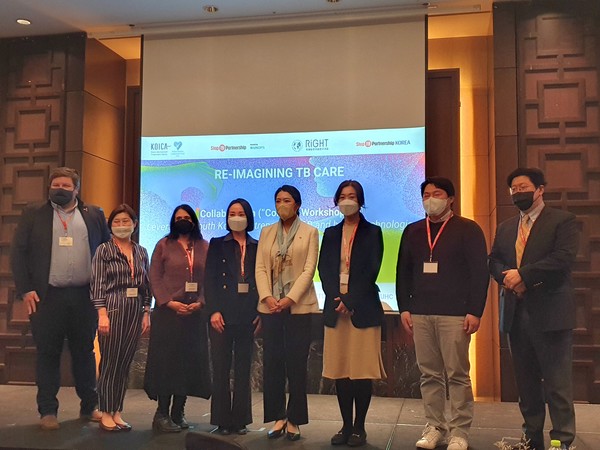The tuberculosis (TB) workshop, entitled "Re-imagine TB Care," highlighted domestic and global TB challenges and how to leverage Korea’s strength in R&D and health technologies to improve access to TB prevention, diagnosis, treatment, and care in TB-affected countries in Seoul on Friday.

The workshop was held in partnership with KOICA’s Global Disease Eradication Fund, the Stop TB Partnership, the RIGHT Foundation and the United Nations Office for Project Services (UNOPS).
Lucica Ditiu, executive director of the Stop TB Partnership, delivered opening remarks via video saying, “TB is an overlooked pandemic which was neglected during the Covid-19 pandemic and TB care needs to be modernized using new technologies to attain these targets by 2030.“
As a result, the UN High Level Meeting targets for 2018-2022 fell short except for the goal of producing 6 million TB preventative therapy for people living with HIV.
Although the workshop highlighted Korea as a global partner for TB, it also revealed that the Korean peninsula suffers from high TB incidence rates with South Korea recording 23,000 cases yearly resulting in about 2,000 deaths annually and North Korea having 133,000 cases per year with an unknown mortality rate.
Professor Sohn Ho-joon of Seoul National University College of Medicine presented Korea’s stance on TB R&D.
“Although domestic funding is increasing, the majority of funding is designated to R&D of TB diagnostics," he said.
Citing Canada as a good example to follow, Sohn explained, "More funds should be directed towards operational research and epidemiology to better track the undiagnosed cases which will help eradicate the disease.”
Subsequently, RIGHT Foundation CEO Kim Hani announced the Product Development Award (PDA) for developing vaccines, treatments, and diagnostic platforms for low- and medium-income countries (LMICs) and the evidence generation award (EGA) for exploring the gaps in the application of digital platforms in infectious disease prevention and control in LMICS. The project grants are valued at 4 billion won ($3 million) for PDA and 200 million won for EGA, respectively.
For the PDA category, teams must include corporations or institution based in Korea while EGA teams must include an insitution based in a low- or middle-income country (LMIC).
In both cases, forming a team of joint research partners with overseas institutions is actively encouraged, Kim explained.
In this regard, proposals will be accepted through the RIGHT Foundation's official website until Jan. 25, 2023, with briefing sessions scheduled on Wednesday and Thursday.
"This year, senior executives from various international health organizations like the Gates Foundation, WHO, CEPI, and more visited Korea and showed great interest in domestic bio companies' infectious disease technology,” said Kim. “Through these networks, we aim to support domestic institutions and companies entering the international public procurement market for companies selected as research funding projects of the foundation."
Related articles
- North Korea’s TB cases still high due to undernutrition: WHO
- Pandemic-caused treatment delays led to more TB deaths
- 'Global health platform needed to help pandemic-hit N. Korea'
- RIGHT Foundation reiterates call for proposals
- ‘Roche to meet APAC diagnostic needs with regulatory agility, innovation’
- Quratis' novel TB vaccine confirms safety, immunogenicity in phase 2 study
- 1st TB rebound in 12 years alarms people over 65

